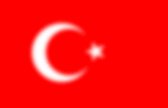

The Politics of Turkish Democracy. Rethinking Modernity and National Identity in Turkey. A Nation of Empire - Michael E. Meeker. This innovative study of modern Turkey is the result of many years of ethnographic fieldwork and archival research.
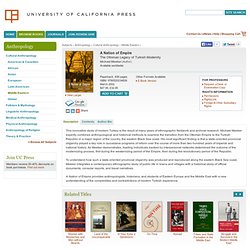
Michael Meeker expertly combines anthropological and historical methods to examine the transition from the Ottoman Empire to the Turkish Republic in a major region of the country, the eastern Black Sea coast. His most significant finding is that a state-oriented provincial oligarchy played a key role in successive programs of reform over the course of more than two hundred years of imperial and national history. Orienting Istanbul: Cultural Capital of Europe? Hanioglu, M.: Atatürk: An Intellectual Biography. When Mustafa Kemal Atatürk became the first president of Turkey in 1923, he set about transforming his country into a secular republic where nationalism sanctified by science--and by the personality cult Atatürk created around himself--would reign supreme as the new religion.
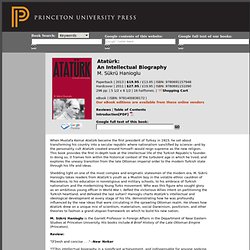
This book provides the first in-depth look at the intellectual life of the Turkish Republic's founder. In doing so, it frames him within the historical context of the turbulent age in which he lived, and explores the uneasy transition from the late Ottoman imperial order to the modern Turkish state through his life and ideas. Shedding light on one of the most complex and enigmatic statesmen of the modern era, M. Sükrü Hanioglu takes readers from Atatürk's youth as a Muslim boy in the volatile ethnic cauldron of Macedonia, to his education in nonreligious and military schools, to his embrace of Turkish nationalism and the modernizing Young Turks movement. M. Review: Hanioglu - Department of Near Eastern Studies. I received my B.A. in Political Science and Economics and my Ph.D. in Political Science from Istanbul University.
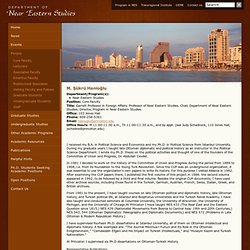
During my graduate years I taught late Ottoman diplomatic and political history as an instructor in the Political Science Department. I wrote my Ph.D. thesis on the political activities and thought of one of the founders of the Committee of Union and Progress, Dr. Abdullah Cevdet. In 1981 I decided to work on the history of the Committee of Union and Progress during the period from 1889 to 1908, i.e. from its foundation to the Young Turk Revolution. Since the CUP was an underground organization, it was essential to use the organization's own papers to write its history. Islamic Political Identity in Turkey: M. Hakan Yavuz. In November of 2002, the Justice and Development Party swept to victory in the Turkish parliamentary elections.
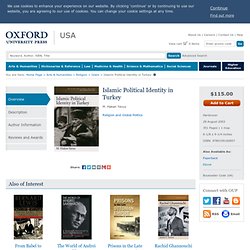
Because of the party's Islamic roots, its electoral triumph has sparked a host of questions both in Turkey and in the West: Does the party harbor a secret Islamist agenda? Will the new government seek to overturn nearly a century of secularization stemming from Kemal Atatürk's early-twentieth-century reforms? Most fundamentally, is Islam compatible with democracy? In this penetrating work, M. Hakan Yavuz seeks to answer these questions, and to provide a comprehensive analysis of Islamic political identity in Turkey. Yavuz argues that Islamic social movements can be important agents for promoting a democratic and pluralistic society, and that the Turkish example holds long term promise for the rest of the Muslim world. Defining the Nation: Kurdish Historiography in Turkey in the 1990s - SOAS Research Online. Atatürk, founder of a modern state (Book, 1981) [The School of Oriental and African Studies, University of London]
Eric J. Zürcher. Tradition and Modernity in Turkey. Synopsis This is a selection of the finest essays by Serif Mardin, offering a historical and cultural analysis of the late Ottoman period and Republican Turkey.

This book collects Serif Mardin's seminal essays written throughout the span of his prolific career. Comprising some of the author's finest and most incisive writings, these essays deal with the historical background, political travails, and socioeconomic metamorphosis of Turkey during a century of modernization. With his characteristic sophistication and breadth of vision, Mardin provides readers with a remarkably objective analysis of ideology, civil society, religion, urban life, and violence in late Ottoman and Republican Turkey. Religion, Society, and Modernity in TurkeyBy Şerİf Mardİn. By Şerİf Mardİn . (Syracuse, NY: Syracuse University Press, 2006), xvi + 388 pp. Price HB $85.00. ISBN 0–8156–2810–2. This book brings together Serif Mardin's seminal essays over the last forty years on the history of the late Ottoman Empire and modern Turkish Republic.
Touching upon the social, political and religious aspects of the last two centuries, the essays have one underlying theme: understanding Turkish social and political history outside the dominant paradigms of ‘Marxisant’, positivistic and secular–modernistic constructions of Turkish culture and society (p. xiii). For Mardin, the top–down analyses of Turkish modernization are marred by their simplistic binaries of religion versus secularism (or ‘laicism’, which works better in the Turkish context), tradition versus modernity, empire versus nation, reason versus science, progressive enlightenment versus dogmatism, etc.